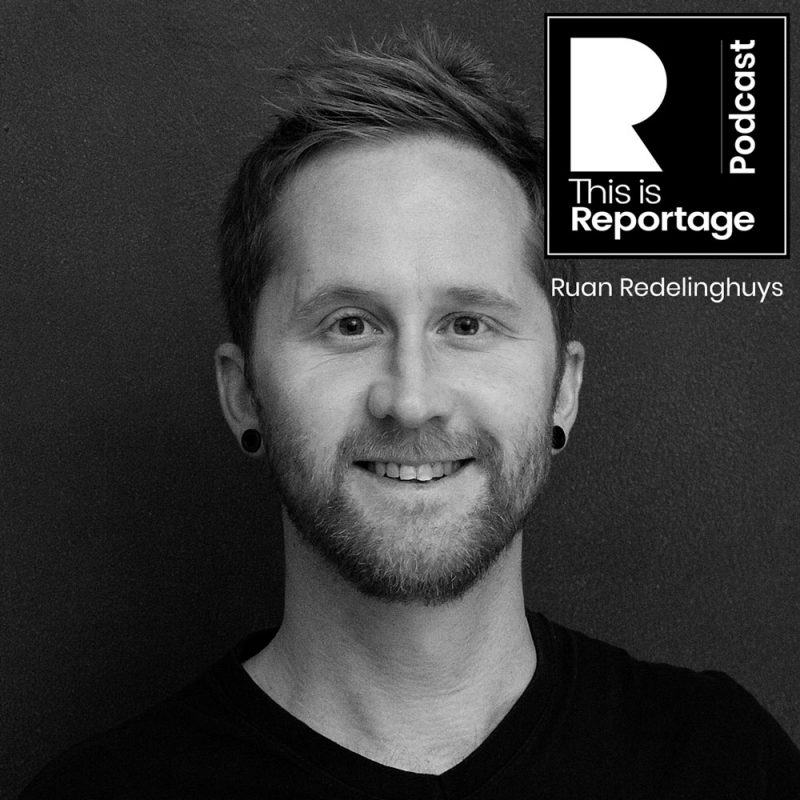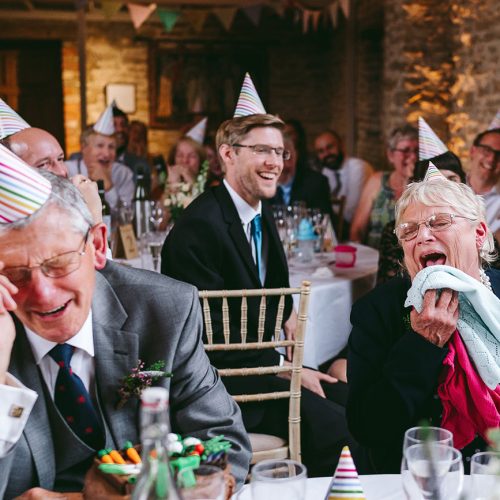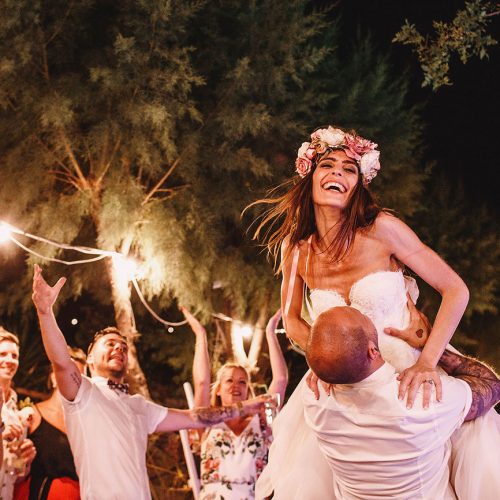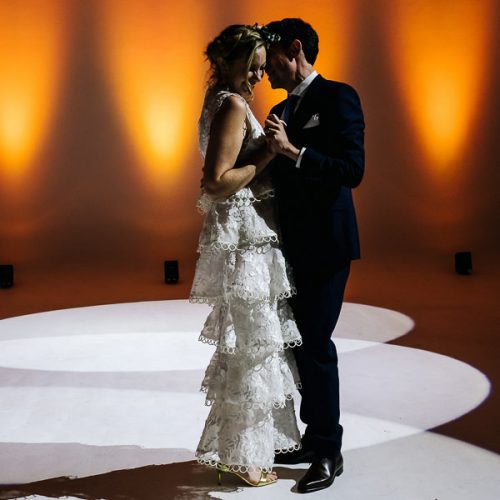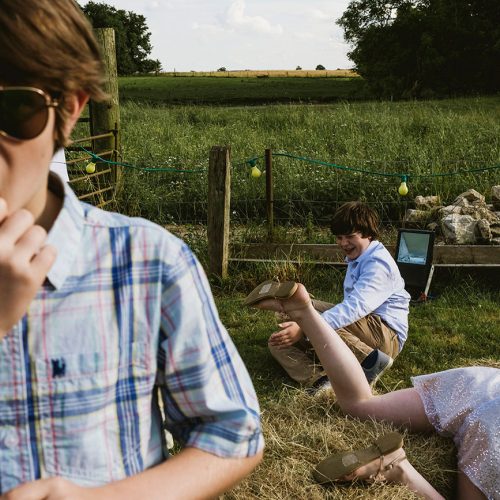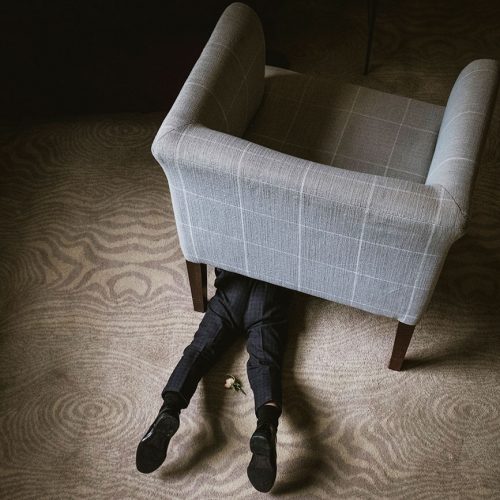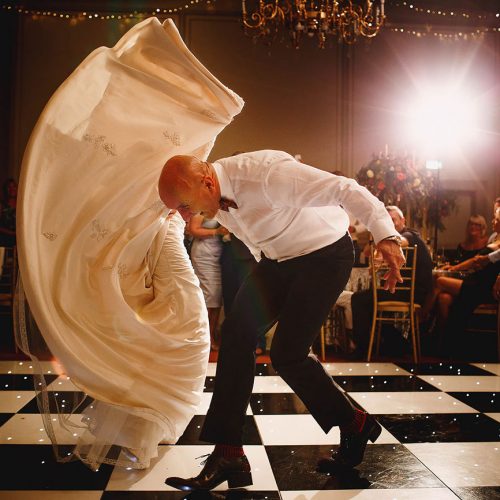Podcast Episode 35: This is Ruan Redelinghuys
Welcome to the 35th episode of the This is Reportage Podcast, where it’s an absolute delight to be talking to the fantastic Ruan Redelinghuys! Ruan, based in South Africa, has been in our Top 30 Photographers for the past two years in a row, has won 10 Reportage Awards and 6 Story Awards, and just shares so much with us in the episode, including:
- how he’s been coping with the pandemic and shooting face masks,
- how he got into weddings,
- the story behind one of his specific Reportage Awards,
- tips for better coverage in general,
- drive, inspiration and pushing himself,
- flash and how he lights a dancefloor,
- how SEO has been an important part of his business,
- the importance of people to bounce ideas off,
- his thoughts on shooting solo or with seconds,
- a specific turning point in his career,
- specific parts of the day that may have some nerves associated with them,
- Canon and Sony,
- running,
- specific tips on editing,
- why digital signing of contracts is the way to go,
- addressing your weaknesses head on,
- and much more…
Listen on Spotify, iTunes, Google Podcasts, YouTube, and below in this post with a full transcript.
Alan:
Hey Ruan, how you doing?
Ruan:
Hi, Alan, good, thank you very much.
Alan:
Yeah, it’s really cool to kind of – well, we spoke just before starting this, it’s kind of like meeting you, but not really, but yeah.
Ruan:
Yes, yes.
Alan:
Lovely to hear your voice, I’ve loved your work for ages now.
Ryan:
Thank you.
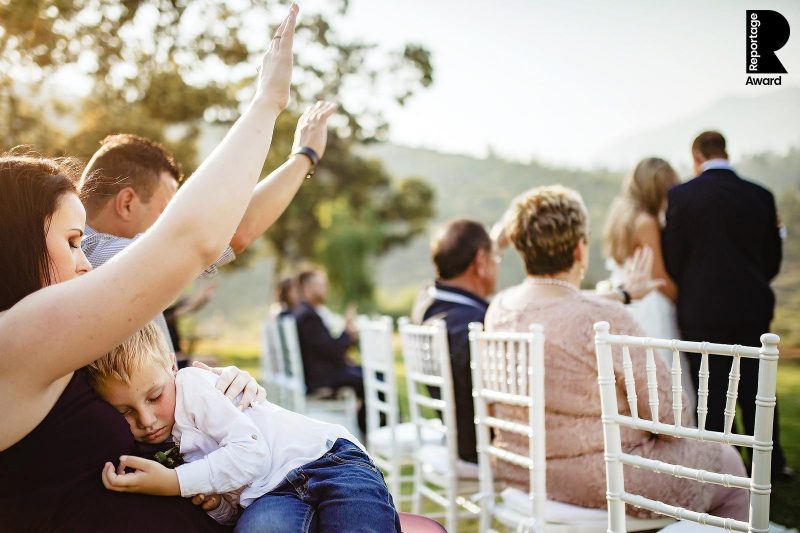
Alan:
So it’s cool to kind of meet you. Yeah, how are things with you? Because you’re in South Africa, aren’t you?
Ruan:
Yes, South Africa in the Garden Route. We’re in the middle of winter so we just went for a walk earlier and it’s nice and cool and I’ve got a blanket close by, jacket and everything so it’s a nice time of year for us to just wind down with everything in consideration.
Alan:
Right, okay, cool. I’ve never been to South Africa, I’d love to go sometime. Does it – is it – in the summer, does it get really hot then where you are?
Ruan:
The area we’re in, not too hot. I think average is about 20, 60, 30 degrees Celsius, it’s not that hot. The northern parts of the country gets quite hot and even just opposite the mountain, a one hour’s drive, it gets quite hot in summer. But it’s yeah, luckily not too warm.
Alan:
Right, okay, that’s okay then and do you get – you were saying you get quite a lot of UK people come over to get married near to you then, do you?
Ruan:
Yes, I’ve had two clients already this year.
Alan:
Oh, you’ve already been able to shoot a couple of weddings, that’s good?
Ruan:
Luckily that was in March so that’s the last summer – that’s when we start going into autumn and sort of the end of summer. So I’ve already had two clients from the UK and it’s quite popular especially this year, because we’ve got wildlife and mountains and forests and ocean, everything within thirty minutes’ drive.
Alan:
Well, that sounds great, yeah, that sounds really nice.
Ruan:
It’s a popular destination.
Alan:
What’s it been like for you though, personally with COVID you know Coronavirus. How’s it has it been affecting your work and how you’re coping at the moment?
Ruan:
Well, at this stage today and last week I shot products and face masks and face shields so we were shooting completely different things at this stage, just to keep the business going and just to keep busy as well.
Alan:
Yeah.
Ruan:
But business itself, a majority of the weddings are either moving or in the process of moving to next year. I’ve got one UK client that’s moved to 2022 just for safety.
Alan:
Right, yeah.
Ruan:
So it’s moving quite a lot. Luckily, the majority of the weddings at this stage are just moved so it’s not outright cancellations. But it’s been tricky, it’s been an adventure and a learning curve as well.
Alan:
I like yeah, adventure’s a good euphemism for it. Oh, man. Yeah, it has been a mad time, hasn’t it? What are the laws like there at the moment? Can weddings even legally take place at the moment? Or?
Ruan:
We’re not sure. We just changed to a level three about two weeks ago.
Alan:
Right…
Ruan:
And as far as we understand, two people, two witnesses and the couple and we think it can change to fifty people with very specific guidelines pretty soon. So everyone’s prepping and has got everything ready that the moment the Government Gazette goes out and say, this is what’s allowed and everything gets published, social media and everywhere to make sure we are ready for those couples that still want to get married during this time, or with someone planning something now.
Alan:
Right, okay, cool, that makes sense. Well, fingers crossed, and it’s starting to ease a bit, isn’t it?
Ruan:
Yes.
Alan:
It’s just whether people – will they want to get married if they have to stay, you know, one and a half meters away from each other or like, two meters. Funny world, isn’t it?. But it’ll all be okay and we’ll be very busy next year.
Ruan:
I can already see next year, it’s going to be quite busy with the movements and then everything, planning for next year.
Alan:
Yeah, that’s cool. It’s gonna be good. It’s gonna be good. Let’s go back to the beginning, not the very beginning, not your birth or anything but on your on your TiR profile, you say that you started this incredible journey by a chance wedding photography invitation. So yeah, what is that? Can you tell us about that?
Ruan:
I think about three weeks before very close friends of mine got married, the bride phoned me and said Listen, we don’t have a photographer. I know that you can shoot and you can shoot portraits and things like that but can you come help us and shoot the wedding. And I thought about it and thought, her, it’s my friends I’m going to do it. It’s fun, exciting adventure and that was a start. It started in 2008 and just slowly – it wasn’t planned to be a career choice and a full time profession but it moved from there on up.
Alan:
That’s cool and 2008 that’s quite a while isn’t it, been doing this?
Ruan:
It is. I think I’ve have changed quite a lot since 2008.
Alan:
You weren’t photographing on film then, were you in 2008?
Ruan:
No, that was, I think, right about the time I moved to digital. I borrowed cameras for the first two years I think. Yeah, my full time job had an office camera and I used that camera and borrowed a camera until about 2010 when I moved from film to digital because I simply couldn’t see myself shooting a wedding with film.
Alan:
No, do you imagine I can’t imagine that.
Ruan:
No it’s and yeah, from there on, moved to completely digital, sold some of the film gear kept some of the film gear.
Alan:
Okay cool. So what kind of photography were you doing before shooting that first wedding then?
Ruan:
Mostly portraits, portraits, business portraits, here and there, I studied graphic design with a photography major and after a couple of years, focused on the design and left photography and it sort of became less and less and less until I was introduced to weddings and then things just changed completely.
Alan:
Right, that’s cool and changed for the better I think you said.
Ruan:
Yeah. Yeah. I’m having withdrawal symptoms at this stage not shooting weddings and the adventure of shooting weddings, so yes definitely for the better.
Alan:
And what was that first wedding like that you shot with your friend’s wedding? Were you nervous? Did you have an idea how you were going to shoot it? You know, what was it like?
Ruan:
I did a lot of research, but I had no idea what to expect. It was fun because with friends, you’re kind of more relaxed. You walk into the wedding and you just start to circulate, do a portrait here or shoot – it wasn’t that much moment based. It was very specific in terms of portraits, shoot here follow the moments where we could but it was very, like, relaxed and fun.
Alan:
That’s cool and they must have liked the photos as well.
Ruan:
I still hope so but yes, they definitely loved images afterwards. I got a good review and good info from them.
Alan:
That’s cool. That’s cool. So then how did you build your wedding photography business from then? Yeah, what was your kind of approach?
Ruan:
From there, I think in that first year, I did three weddings and it was all very close family and friends and it still wasn’t really a direction that I was aiming to do full time, I was just helping people out and enjoying myself and having a good time. And then I started shooting with a friend who did weddings on weekends, and joined him second shooting, helping out, learning. And then I think it took about two to three years before I fully moved into promoting myself and promoting my own brand and my own name and that grew until I think 2015 when I left my full time day job and went completely professional and from there just grew completely and became this incredible adventure we’re on now.
Alan:
Oh, that’s cool, man. That’s cool. What was your day job then before doing this full time?
Ruan:
Graphic designer.
Alan:
Oh, yeah. Sorry, you did say, didn’t you about graphic design. Yeah, no, that’s, Oh, that’s cool. That’s a handy skill to have though, as well with setting up your wedding business, being in graphic design.
Ruan:
Yeah, everything, website and print based and printing items and all that. I think it just helps with composition as well when you shoot, you think layout and think sort of the frame and filling the frame and using the frame to its max so I think graphic design does help quite a bit.
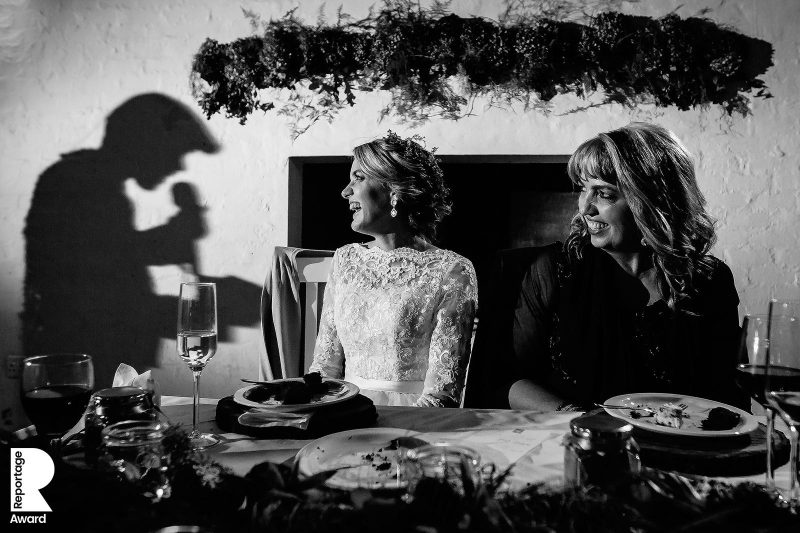
Alan:
That’s really interesting to hear about how it’s maybe informing your composition choices. Well, that’s really interesting. One of my personal favorite Reportage Awards of yours (above) is what it appears to be during the speeches I think with on the left of the frame is the shadow of the speech giver. Yeah, and then this fab reactions of what looks like the bride and maybe another woman who looks just like the bride so is it maybe her mom or sister or something? Are they?
Ruan:
Yes, groom’s speech, bride and I think the bride’s mother to the right.
Alan:
Oh okay, and that is such – oh, I love that shot, man. It’s so cool. Yeah, it’s so clever to see the shadow of the speech giver, can you can you tell us about that shot and how you got it?
Ruan:
I think it’s now this June about two years ago and it was, for me that’s quite a special shot because it’s a process shot, it took a while to sort of work out the shot while the groom was pretty busy with his speech. He was busy with his speech and sort of by chance, l saw the shadows and move the lights to get the shadows in the right position, and then slowly building that shot throughout his speech until I got to the shot that I wanted. And that was quite incredible to do and sort of build that up and get that frame.
Alan:
It’s proper cool and I mean, it’s so creative. I think, you know, I don’t think I would have even seen the opportunity to get the shadow of the speech giver but – and to get the reactions as well of the bride and her mom like that all in the same frame. It’s so cool, man. I love it. It’s so good.
Ruan:
Thank you. Yeah, I think that’s that was the key that you needed something from the bride otherwise, it would have been a very bland shot, you needed something more to just lift and balance the fact that it’s creative on the one side and the reaction on the other side.
Alan:
That’s so true. Yeah, that’s so true. If anyone’s listening to this podcast while cycling or anything, do head to the site and I’ll include that that image that we’ve just spoken about there which is awesome. One of your many, many awards Ruan – you’ve been in in in our top thirty photographers for the past two years in a row, you know, you’ve won loads of Reportage Awards, loads of Story Awards, yeah, how do you do it then? I know that’s a big question to say how do you do it. What do you think, you know, what to you makes for great documentary coverage? You know, what’s, what’s the secret?
Ruan:
I think the big thing for me is just to follow the story on the day, try and find the story in different moments, something that I learned a couple of years ago is just to – the different parts I wasn’t good at in the past – to work really hard in finding stories in those moments in different parts of the day and making them your strength, the evening speeches things like that, the speeches is an incredible time to try and find a story. You can do one or two quick shots, you’ve got the good portrait and the good frame and then you can try and build a story, you can get a reaction, get a shadow, reflection you can get something to just build a really incredible story. So that – trying to just find that story throughout the day, making speeches, etc. all those moments where it’s quite easy to stand back to rather go in and find that that magic and that story.
Alan:
That’s cool and that’s great advice, that is great advice, man. Cool, awesome. Let’s change tack then slightly now, let’s change tack.
Ruan:
Yes.
Alan:
Okay, yeah, I’ve not asked this question before but it’s interesting I think when – it’s an odd one to go from photography but…When you’ve reached old age and you’re looking back at your life, what would you like to think about the life you’ve led?
Ruan:
I’m not – how can I put it? I think just to know that you tried and pushed really hard to get what you wanted from life? And I think in what we do in terms of what as wedding photographers, you really have to go full out to get that magic shot and that magic moment and in life as well. Going full out for that one thing that you want, for that life that you want, and making it happen. Does that make sense?
Alan:
Yeah, that’s great. Yeah, definitely. I think, that’s – Have you always been like that? Have you always been a very driven, you know, from school and kind of, you know, tried to do your best to everything? Have you always been like that?
Ruan:
I don’t think so, I think it’s something that once you reach a certain age and you start working for yourself, you have to have some sort of drive to get motivated and go for your deadlines and especially if you sit in your office at home, you kind of need that something to make yourself push harder and further to achieve your goals.
Alan:
That is so true and what is that for you what does drive you to, you know, what is your drive and your inspiration?
Ruan:
Sure, I think currently family is quite a big – through this whole Coronavirus thing – family is quite a big inspiration to get focused and readjust and sort of try to go. I think that’s quite a big thing and just personally, to try and do better than you did for the previous shot or the previous frame, and grow the business set goals, things like that. That’s sort of just a personal drive.
Alan:
That’s cool, man. That’s great. Yes. You’re a dad yourself?
Ruan:
Yes, yes I’ve got a four year old daughter, well almost four year old daughter.
Alan:
Aw, cute. Oh, that’s cool. I see, she’s not at school yet then or?
Ruan:
No, no, she’s – Now with the virus, it’s, I think, just certain grades are allowed back to school, but she’s, I think, next year starting school.
Alan:
Oh okay.
Ruan:
Lower grades.
Alan:
Aw, life changes when they start. But you will have so much more time on your hands as well. Yeah, it’s an odd thing really.
Ruan:
Yeah, I can imagine.
Alan:
Okay, totally original question here, which is it’s not actually at all but imagine you’re cast away on a desert island, what one album would you take with you? Are you a music fan? Are you into music?
Ruan:
Oh yes, I’m a big music fan so that that’s a very difficult question. I think probably Lost Dogs from Pearl Jam.
Alan:
Oh you’re a Pearl Jam fan. Oh, okay, cool.
Ruan:
So I think that’s sort of more the B-side songs, not the ones we listen to all the time. I think that might be a good choice to take with and it’s a longer album as well.
Alan:
Oh, that sounds good, cool. Do you know it’s a band, I’ve never really listened, I’ve had you know, I had Ten when I was younger, like everybody does have that album but I’ve never really listened to more. Are you a really big fan then?
Ruan:
I am quite a big fan. I think that’s my sort of last bucket list band.
Alan:
What? To see live?
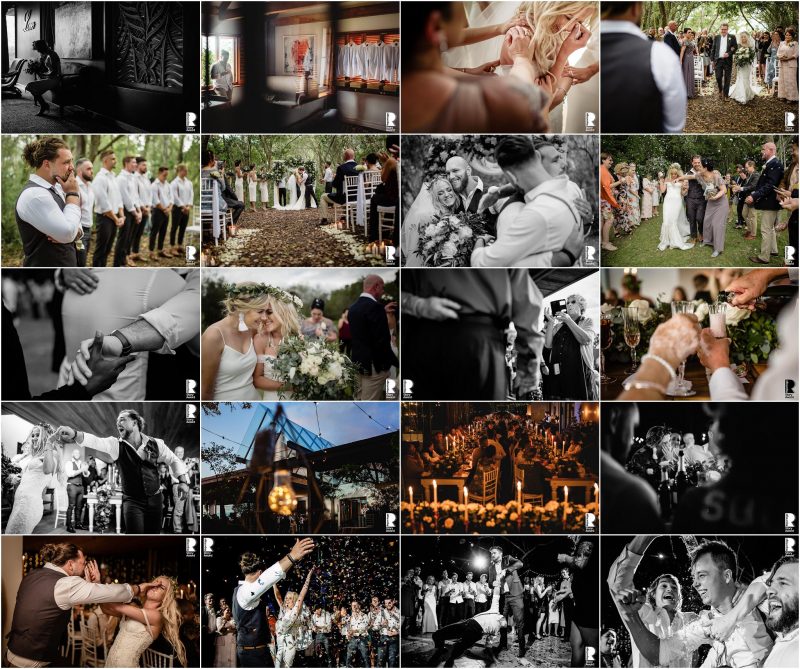
Ruan:
Yup, to see – I’m a fan club member for many years. I’ve got stacks of T shirts and all those things. So yes, definitely quite a big fan and can’t wait to hopefully see them one day.
Alan:
Aw yeah, I’ve never seen them live. Yeah, that would that would be cool actually. Cool, okay, if you weren’t a wedding photographer, what would you do for a living? And you can’t do graphic design either, what else would you do?
Ruan:
I’ve got such a long list of professions that I wanted to do. I think there was a stage in school when I wanted to be an architect and I drew house plans and houses and buildings. Yeah, architect was, I think that’s the first one that comes to mind and same as most boys, fighter pilot, all those things, all those really cool adventure things.
Alan:
That would be cool. Yeah, that would be cool. Yeah, architect, there’s a lot of money in architecture as well.
Ruan:
I think just that need to create and work with lights and in hindsight, work with light, I don’t think when I was at schools, the light was the influence, but just to create this big, impressive buildings that stand out, and…
Alan:
That would be cool, definitely. Well, you know if weddings don’t go ahead for the next five years or so but I’m sure they will….
Ruan:
That’s a good time to start learning, getting sort of that degree ready for architecture if need be.
Alan:
Yeah. What has it been like? So you said earlier on that you’ve been doing product photography of – was it of like face masks and stuff, then?
Ruan:
Yes, with the sort of the onset. My wife worked for a printing company and they started promoting face masks and face shields and producing them and I started photographing them and all within certain lockdown regulations and that was quite fun and interesting to make, so sort of set up a studio in the garage and shoot, sort of reflect, highly reflective transparent optics – that was a nice learning curve as well.
Alan:
All right, yeah, I wouldn’t have a clue how to do that kind of thing. It’s an art in itself. I imagine it must be, yeah.
Ruan:
It is – especially when you work with the face shields that’s got – everything is reflective and see, if you’re a wedding photographer, you don’t have access, usually access to strip lights and all those things. So it’s sort of a change of mindset.
Alan:
That’s cool, though. Are you quite – the way you approach your weddings? Are you quite technical? You know, do you work with multiple flashes and things or are you a low fi shooter? What’s your approach in that way?
Ruan:
Different parts of the day, during the early part of the day, I’ve tried to be as low profile as possible. So I’ve got all my gear with me but I try to only shoot with a camera and body and lens and a backup body and lens.
Alan:
Right
Ruan:
And during the couple portrait session, I’ll get more lights up if needed or if I can use it, if the weather allows for it and during the evening, I’ll bring out quite a number of lights for the speeches and for the dance as well and just have them ready for when it’s needed –
Alan:
That’s cool
Ruan:
And for the dance to get those really sort of action in the moment shots.
Alan:
Cool. Yeah. How – so like for a typical dance floor for you, How many flashes do you set up?
Ruan:
I think at most it’s probably about six speed lights.
Alan:
Oh wow, that’s cool.
Ruan:
That’s all zone – kind of – sort of – you chop up the dance floor in zones and you sort of zone focus or zone the lights for certain areas as well.
Alan:
Wow, man, that sounds so technical.
Ruan:
It’s one of those things – the dance floor and the evening – it wasn’t a strong point early in my career and you just make it work and you try and learn and you try and figure out how Two Mann get the incredible crazy dance floor shots things like that and then after a while you just sort of figure it out and get the magic and then that becomes a part when you don’t really feel like going home when it’s 12 o’clock and you’re like okay I really have to go home now but there’s more shots to get.
Alan:
That’s cool, that’s a great mentality, that’s really cool. What are weddings like in South Africa? Are they normally like really long affairs, like to the early hours of the morning or?
Ruan:
Not really, I think most of my long-ish weddings that go one, two o’clock; it’s mostly been clients from outside South Africa. But most of the time the wedding coverage ends usually between ten and eleven in the evening for me and most wedding photographers and weddings go between 12 and one o’clock or 12 and one in the morning Alan:
Okay, so yeah that’s similar to UK then, that’s similar-ish. Have you ever shot a wedding in the UK by the way?
Ruan:
No, no I haven’t been there, haven’t shot. We made a plan a couple of years ago to go there before Brexit. Our currency was something like twenty-four to one and we thought that’s a really good time to go and try and get a visa and shoot in the UK but no, I haven’t been there yet.
Alan:
Oh man let’s do a swap some time we do a home swap, that sounds good.
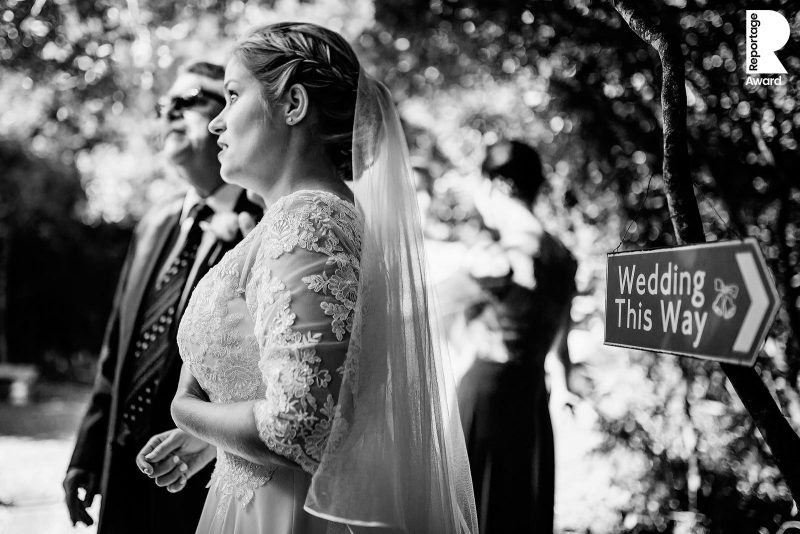
Ruan:
That’s a really good idea.
Alan:
We could do a home swap and a wedding swap at the same time. That will be cool
Ruan:
I’m onto something really good for a sort of an adventure, a home swap and everything lined up.
Alan:
Sounds perfect, let’s do it. Before obviously Corona times, what do you think, I mean, I asked – what do you think the secret, I know is not secret, but what do you – a secret to having a full diary of bookings, you know, or to have as many bookings, as you need, you know. What do you think the secret is?
Ruan:
I think putting work out there that people can resonate with, I think that’s the number one. Knowing your audience and the clientele you want to promote to, to make sure that they see something that they want in terms of their wedding coverage. There are so many different styles, even not in our countries, but documentary, lifestyle, a more formal approach and a more fashion approach and knowing who your clientele is and who you’re trying to promote to and making sure that you put the work out there that they can see and then obviously balance it with pricing and your marketing effort.
Alan:
That’s good and what’s – and what kind of – are you using kind of like Instagram? How are you pushing your work out there? Is it just through your website? Or do you – like avid user of social media as well and things?
Ruan:
I do use social media. I don’t use it probably as well as I should. I focus a lot on SEOs so my approach has been SEO from the start.
Alan:
Oh cool, okay.
Ruan:
To make sure that different areas, if we decide we market for a different area of the country, then we can push the SEO to lift in that area and feature and rank quite well.
Alan:
That’s cool.
Ruan:
So that’s been through more of an approach than social media.
Alan:
And no, that’s great, cool, and that’s obviously working for you as well. And that SEO side, do you have an agency to do that? Or do you do that yourself, the SEO?
Ruan:
No, that’s – well, I’m sort of self-taught and learning from all the gurus out there and YouTube, as much as possible to understand how it works.
Alan:
That’s cool. I get that real sense from you, I do. Just from talking, I think that you, if you want to do something, you just learn how to do it and you do it which is just great though. I think that’s really inspirational, I think. It’s cool man. It really is. It’s awesome.
What do you find the most challenging aspect of our business to be? So it could be the most challenging aspects of shooting or you know, something to do with running a business, what is the most difficult bit for you?
Ruan:
I think in terms of running a business, a lot of the time you need a soundboard, you need that someone to just bounce an idea off or if you’ve got a difficult situation, just someone to make sure you’re making the right call in the situation. So business wise, that’s usually what – if you’re working on your own, that someone to just bounce an idea off is sometimes needed, quite often. And in the industry itself, I think, as a wedding photographer, just to make sure you manage expectations, in terms of your clientele, and what they need and what you’re producing.
Alan:
Cool, great, great tips… is your sounding board your wife? Does she –
Ruan:
It is.
Alan:
Yeah, and for me, and for me.
Ruan:
My wife and then a handful of – Luckily, a lot of the photographers are open to talk and like just a quick What’s App to ask advice what to say – hey, I am struggling with this. What’s your opinion on this? So that helps quite a lot too, to talk to some of the other photographers in the area and in the country as well.
Alan:
That’s cool. That’s very cool. Overall, yeah, the photography scene is very friendly, isn’t it and very supportive?
Ruan:
Yes, it is. It’s – I mean, just advice through this COVID crisis, in terms of contracts and all those things, it was quite easy to just ask someone their advice on different things and how they would approach it. So that was quite nice to sort of use and access
Alan:
Yeah, that is cool. And we mentioned your wife there as well as a sounding board. I like the way on your website, you say you’re married to a talented creative genius. That is so nice. That is cool.
Ruan:
Yeah, she’s the one that sort of got my new branding going and all that. It’s amazing to have access to that.
Alan:
And big brownie points as well for when she reads that on the website.
Ruan:
Of course I think that’s part of the plan.
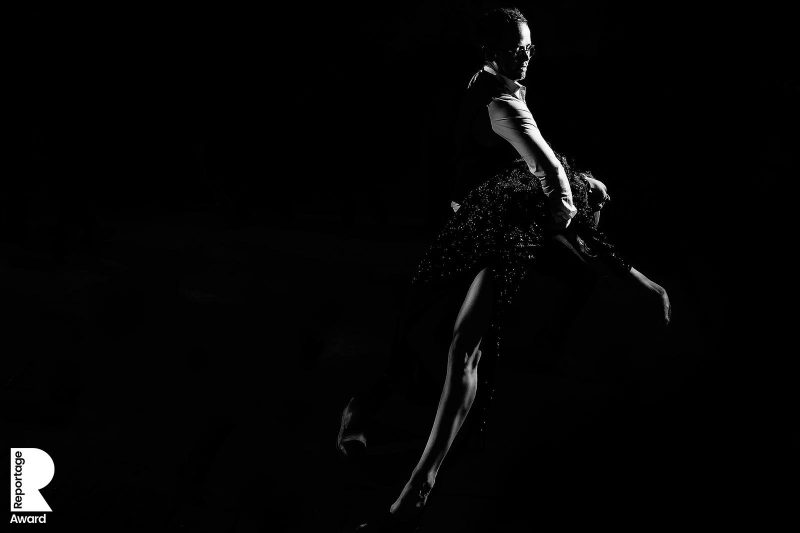
Alan:
Oh, that’s cool. Yeah, I so agree, though. My wife is really my sounding board and everything and she’s been just so important, so pivotal. She was the one who put me starting doing wedding photography in the first place. I owe a lot to her, actually.
Ruan:
Yeah, sounds very familiar. She – my wife helped, sort of was my assistant at some stage and so she understands and knows, sort of what’s expected and if there’s a situation, how to approach it best.
Alan:
That’s cool. Sometimes the female touch is just so much better than ours, isn’t it? I think
Ruan:
Definitely, just their approach as well, yeah.
Alan:
Yeah. You mentioned maybe assistant there as well so this brings me on to a question. Do you shoot your weddings sometimes with a second, you know, always with the second or mostly on your own what’s your approach?
Ruan:
I shoot mostly on my own but it feels that if I’m more focused if I shoot my own. We plan the day – I plan the day with the couple, make sure the coverage is equal and thorough. But I work really well on my own and then now and then, there are weddings where it’s required to the second shooter or an assistant. If it’s a Chinese wedding or a Jewish wedding, then there are certain requirements that’s needed. Then I contact someone locally to come and help out.
Alan:
Cool. Do you enjoy when you do work with a second?
Ruan:
Yes, I did a wedding about two years ago that was quite a big wedding and the second shooter made such a massive difference so there are times when it just helps so much sometimes, just to have that someone to talk to and sort of have with.
Alan:
I totally can understand that. I think I’d just be scared – I always shoot on my own – I’d be scared of all the extra editing, all the extra culling I’d have to do is well,
Ruan:
The extra work is quite a number of – quite a bit extra but it’s nice to see a different approach. The last one, I think it’s the second one or last one I did before lockdown and the second shooter nailed an incredible frame. And it was just going through the files and you see that and you stop and you just think, well, it’s the couple will be – it was a moment between the father and his daughter and it’s just such a perfect frame and when the second shooter delivers that, that’s just the magic you want from that situation.
Alan:
Oh, that’s cool. Yeah, great, great stuff. Has there been a specific kind of turning point in your career at all? Something, you know, a certain wedding or a certain award or anything that’s had a major impact on your career?
Ruan:
Sure, I think the big change is…Christelle Rall. I think she’s with one of the judges at some stage.
Alan:
Oh, yeah, yeah
Ruan:
She was staying in the same town as I’m staying, and she offered a mentorship and that introduced me to just a completely different way of thinking and shooting moments especially and that was a massive turning point. Before that, I tried to shoot moments but couldn’t really get it to that next level and didn’t know how to shoot through a moment and to compose it properly. And she just sort of gave the insight and the direction to make it something really magical and that’s been quite a big turning point.
Alan:
Oh, that’s cool, that’s, great. Same for me, the workshops that I’ve been on have been massive turning points in my career. Have you gone on other workshops since then or the mentoring –
Ruan:
I did that mentorship and the workshop from Brett Florens for the portrait side and for the business side of things. Those have been – and when Yves Schepers and Dries, they came to South Africa for a mountain bike trip and I sort of had an evening with them, sort of did a quick portfolio review and that was insightful as well, just to sort of –
Alan:
Oh, that’s cool.
Ruan:
So that falls the closest thing to a sort of workshop environment.
Alan:
Right, okay, cool. But cool, Yves and Dries, top guys as well, like, Dries always gets mentioned on this podcast.
Ruan:
I’ve heard. I think he’s probably the most mentioned guy in terms of influence and helping people.
Alan:
Yeah, it’s cool, yeah, ‘cause Yves lived with him for a while, didn’t he as well, I think? Yeah, funny. funny. It’s like this worldwide community and yet it’s so small as well, in one way, it’s funny.
Ruan:
Yeah, that’s crazy. I’m sitting in South Africa and in some way there’s a connection to someone in Belgium and the UK and it’s crazy how things are connected.
Alan:
It is, isn’t it? It’s mad, it’s mad. What’s the most bizarre or funniest thing that you’ve seen at a wedding?
Ruan:
Sure, I’ve seen a couple of crazy – I think in the Afrikaans culture in South Africa, things can get a bit loose on a wedding day on the wedding reception.
Alan:
Okay.
Ruan:
So I’ve seen people in underwear and things like that on the dance floor quite often. It’s funny to shoot because you know, you can get a really crazy shot from it.
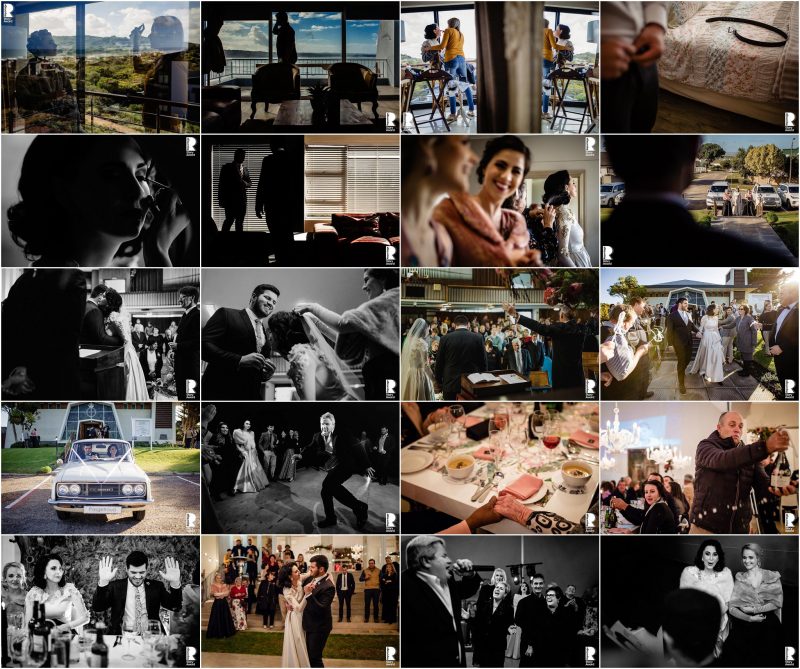
Alan:
Right.
Ruan:
That’s something I’ve seen quite often.
Alan:
That never happens in UK weddings. If we did the swap, you’d be very disappointed.
Ruan:
That happens and it can be quite an experience to photograph if it’s all within reason, so it’s not too crazy, but it’s funny moments that can happen at some weddings.
Alan:
Oh, that’s cool. It’s mad that we do this as a job, isn’t it? That we see such different things every weekend, it is mad.
Ruan:
And especially what’s normal for us, if you do it for one year or two years, then certain things become normal and to explain that to an outsider, it can be sort of eye opening to them.
Alan:
That’s so true. Yeah, that’s true. How do people generally react, you know, if you’re out with your wife or something or just out and someone asks what you do, how do people generally react when you tell them that you photograph weddings?
Ruan:
Most of the time, because photography’s changed to something that’s sort of got a good profile about it sort of, I get a good reaction from it. But I’ve had people tell me, I’ve had someone at a wedding pull me closer and said: Wow, you must have an absolutely terrible job because you’re just running around all day, you’re working every Saturday, you’re not seeing your family and then you counter that and say but I’ve got to do all this and I can – There are other times where I can balance the things out. So it’s mostly positive, but I’ve had one or two people that sort of see the different side to it as well.
Alan:
That’s funny. That’s good, okay, that’s good that you’ve had both sides, really? Because sometimes people will come up at a wedding as well and say, it must be amazing only working, yeah, one day a week but we do a little bit more than that.
Ruan:
I’ve had that. I think in the beginning years. Now, it’s changed, like people are more educated in terms of what goes on to produce something. But they still – the first – the two biggest questions is, can you have the files ready in a week and that’s from the guests, and how many pictures have you taken? So those two are probably every single wedding – two most asked questions.
Alan:
Oh, yeah, that one how many photos have you taken? Every time! Yeah, I sometimes just say about five and they’re all really bad. Do you get nervous shooting weddings at all?
Ruan:
The wedding itself, not really but I do get nervous before the wedding ceremony and before the first dance and I absolutely don’t know why those two moments but those are the two where I get – I go beforehand and make sure I’m well prepared to counter sort of the fact that I know I will be nervous before shooting that and those two each and every wedding – the wedding ceremony and the first dance are the two where if there’s nerves, the nerves will be on during those two times.
Alan:
Oh that’s interesting. I wonder if – I guess they’re both moments that are kind of one offs that will never be repeated throughout the day – is that the reason why, I guess?
Ruan:
I can imagine that’s the only reason why but I’m not sure why. All the other moments I’m fun, I’m not really stressed or worried too much but those two are the ones where if there’s stress it’ll – if there’s nerves it’ll come up during those two times.
Alan:
I would – have you had any kind of like moments of trauma during those parts, like during the ceremony like your cards have failed or something that’s causing this?
Ruan:
Luckily not. Luckily, I’m all fine with cards and camera failures and I’ve had kind of the evening camera failures, but that was –
Alan:
Oh, no!
Ruan:
I have a backup camera on me and brought a second camera and it was late at night. So it was luckily not a problem.
Alan:
Oh okay, cool. Oh and ceremonies in general in South Africa, can you, you know, because a lot of ceremonies in the UK it’s quite strict in terms that you know, as a photographer, we can’t really be moving much for a lot of them. What’s it like in – for South African ceremonies?
Ruan:
Majority of ceremonies these days are outside or at venues and then you can move, it’s not as strict. But some churches or chapels do prohibit movement or asked me to only shoot at certain times or only at the exchange of the vows or only from a certain angle so there are some events where you’re required to only stand at a certain spot, or stand at a certain area.
Alan:
Oh okay, but quietly. So what cameras are you using at the moment?
Ruan:
Canon 5D III and a 5D IV
Alan:
Oh cool, okay. Yeah, man, the five – the 5D III was my first full frame I love it. It’s an awesome camera
Ruan:
So much – what – we’re waiting to see what happens with the new cameras coming out on the new mirroless and how much it’ll change everything in terms of the cameras and using it to get a better frame and a better quality file from the wedding day.
Alan:
That’s true. I mean, yeah, I enjoy – I did switch last year to the Sony’s and I just fancied a change of system, to be honest, I love – I use the silent shutter on the 5D III but it still makes that kind of put-put sound.
Ruan:
It’s not completely silent so I can’t really lie to someone about the amount of frames that I shoot. If they want to count it, it’s quite obvious to listen to.
Alan:
Right, yeah.
Ruan:
But yeah, we tried out the Sony system when they had a roadshow in the area and it’s incredible. I think the Sony is – just what it offers in terms of the quality of the files, it’s quite amazing,
Alan:
Yeah, I have enjoyed it and the whole kind of just being able to see your exposure you know, not having to chimp I find is really cool. Is there anything – you sound a very positive person, Ruan, you really do. Oh, definitely, definitely. Is there anything that kind of bugs you or annoys you about our industry at all?
Ruan:
I think it can be challenging the, sort of, the expectations and I think what I mentioned earlier about making sure the communication is clear that the expectations in the industry can be challenging at times if you don’t communicate properly with a supplier or with a venue or with a client, to making sure you manage all that. If that’s not properly managed, then you can have difficult situations. Does that make sense?
Alan:
Yeah, that makes sense, totally, totally.
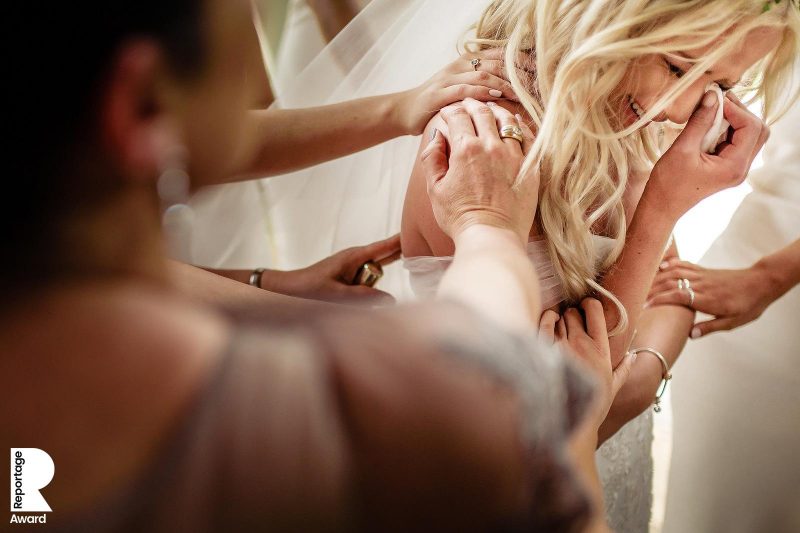
Ruan:
And then obviously, in season you work quite hard so that’s just to get time off in season. That is usually the one thing, I learnt. For us, it’s – we’ve got quite a long season as well.
Alan:
Oh, is it? Really?
Ruan:
Make sure that you stop and you take a break in between with family and for yourself as well.
Alan:
That’s so true, isn’t it? What do you do for you in your kind of downtime if you get any downtime, you know? What – are you a gamer, do you run, watch TV? What do you enjoy doing?
Ruan:
I started running this year but I’m so far off from a proper run at this stage, we walk in the mountain quite often so we are planning, for this weekend again, just for a nice walk in the mountain and things like that so outdoors as much as possible.
Alan:
Oh, that’s cool. It sounds lovely, it says beautiful where you are. Are you near the mountain?
Ruan:
It is, I’m – sure I’m not – less than a five minute walk then I’m in the forest and in the mountain. It is vey nice. I’m very happy where we are staying and it’s not a place I’ll leave too easily.
Alan:
Oh, man, yeah, sounds lush. And how have you got on with running because I I’ve tried to run man but I just, I don’t enjoy it. Do you enjoy it?
Ruan:
I used to run when I was at school and I did long distance running and I was successful and then life happened and completely sidetracked and then end of this last year, I decided to start running again and I’ve been struggling. It’s not been the same easy running as it was 20 years ago, I’m constantly pulling muscles, I’m not warming up properly, getting up too early in the morning and eventually bought a exercise bike. And that’s helped quite a lot just to make sure I stay fit and healthy. So try and balance that with running and exercise and running and cycling.
Alan:
That sounds good, that sounds good. Because it is so important to stay fit, isn’t it? It is such a physical job that we do. What’s like the season for you then? What’s the typical – what months are your typical season?
Ruan:
I think the two months that are completely out of season is middle June to middle August and very few weddings there and then sort of a slow start from September to November and then it’s peak season till middle January about and slow down again and then pick up from end of February until middle May about where it’s quite busy. It varies in the area in the country so Cape Town you have quite a long summer season and it starts in September and it goes straight through to around about May before winter starts.
Alan:
Right.
Ruan:
And different areas and if you’re on the East Coast you can have a longer season because of the climate as well.
Alan:
Oh okay, wow, it’s interesting it’s, yeah, it’s – I so love hearing how you know different seasons all around the world and yeah, it’s just cool. It’s very – quite different to the UK is I guess. So in December, are you – you’re really busy in December normally.
Ruan:
Yes, we stay in an area that’s very popular for holiday destination, especially for families. December, it’s normal to book out every weekend in December, and then Monday to – we try to not shoot on Mondays but say, Tuesday to Friday, you’ll have family portraits. Morning, afternoon. Morning, afternoon. Morning, afternoon.
Alan:
Wow, man.
Ruan:
That’s quite normal for a December season.
Alan:
Wow.
Ruan:
That’s where that rest must come in. You must sort of make time otherwise you can reach burnout if you don’t look after yourself.
Alan:
Yeah, definitely. Have you ever hit that kind of brick wall, you know that real burnt out time? Has that ever happened to you?
Ruan:
I’ve been close a couple of times. I think I’ve hit that as a designer years ago. And you kind of know what to look out for and make sure you stop and rest and, and just take sort of a perspective on things.
Alan:
Yeah, so important. Cool, okay. Regarding, something I’d like to talk about with your works, I just love the look of it. Your editing specifically is awesome. Can you, you know, tell us a bit about how you do yours, maybe just any tips or bits of advice, maybe in workflow or do you use any kind of like keyboard shortcut systems or yeah, just your editing in general.
Ruan:
I think the big thing for me is shoot for the way I want to edit. The editing does – most of the time doesn’t take too long for the basic editing and that time when Yves and Dries were in South Africa for their holiday and they sort of just pulled the trigger of the idea of shooting for the highlights and before that I shot more for skin tone or mid tone and since then it’s changed the editing as well. It made the editing – I shoot, what I want to shoot and the story and edit for that if that makes sense.
Alan:
Right yeah.
Ruan:
And that’s changed the editing time as well, it sped up the process and just to make sure you sort of – what I see there and shoot there and try and shoot it as accurately as possible. And shoot the white balance correct. Shoot everything as correct as possible and just adjust where needed, pull some shadows back if needed. And dodge and burn where needed to get the focus in a specific direction.
Alan:
Hmm, cool. Yeah, that all makes sense. I mean, and you must have so much editing to do say in December if you’re shooting a wedding each weekend and then you’ve got all those family shoots. Are you personally doing all that editing as well?
Ruan:
Yeah, January is usually the slow month so January I’ll maybe have one to two weddings and portrait shoots for the first week of January and then after that, it’s quiet and everyone’s either back to school or don’t have money for the rest of the month, whatever the situation and it’s quite quiet and then it’s just – work really hard to finish it up and go through all the work.
Alan:
Right, okay. Wow, man, but you must be in front of a screen quite a while.
Ruan:
That’s – December, January is quite tricky. So that’s a time when you shoot quite a lot outdoors and having fun for December and in January, you’re indoors and it still summer, it’s still amazing weather but you’re staying indoors just to get through all your work as much as possible.
Alan:
Yeah, mad, mad. Do you have a particular piece of software or app that you couldn’t do without, you know, any kind of piece of software or app except for Lightroom maybe because everyone uses Lightroom. Yeah, anything else that works with your workflow or social media or anything?
Ruan:
I think for social media scheduling, I use Later or Latergram just to schedule that and that’s been super helpful. It takes me an hour or two – it took me in about an hour to do this week’s the whole week’s posts. The longest part of it was just writing the actual post but dropping it in is quite easy. And Acrobat, Acrobat for the option where you can have contracts online and clients sign it digitally. That’s quite convenient and just changed everything to make it quick and easy.
Alan:
That’s good advice as well. You know, I’m still well behind the times, I still have paper contracts that I get people to scan and send back. It’s so old school, isn’t it? I need to get with the times. Is it quite easy to do then with the digital?
Ruan:
The digital one, we’ve got the full Creative Cloud suite so and then that’s included with the, I think it’s called Adobe Sign. So you just set up your form, and you upload it and you select the blocks where they need to either fill in a number or need to sign and once the client, you get the inquiry, you just send the form to them put in their email address, and you get a copy, they get a copy. You get a notification of when they sign it and then everyone gets a copy and it’s done. And you know that they’ve signed it. With the paper copy the grandma can sign it and you won’t know who actually signed the form.
Alan:
That is so true. Oh, that makes sense. That’s so much more 2020, my approach is more like 1990 I think so I need to do that. Do you, Ruan, do you have any advice for people who have been shooting for you know, quite a long time and who are maybe, you know, not quite happy with their work at the moment or their career is not at the point where they want it to be? Do you have any maybe thoughts or tips about that?
Ruan:
I think to try and find that, it’s easy to say when you’re on the other side of the fence, if you’re not struggling with that specific thing, but to try and find that one thing that’s not working and work on that specific thing. That’s been helpful in the way that I shoot, if there’s something that’s not working to sit down and figure out, how do I make it better? How do I change my technique, my approach? Is it my personality when I arrive? What is it that’s not making it work? And work on that to make it better and make it a strong point. Change it from what’s not your strongest point to something that you excel and, and relish to do.
Alan:
I think that’s really great advice. Yeah, that’s great. It’s like the opposite of, of putting your head in the sand, you know, it’s like really addressing the things that you need to address and yeah, I think that’s really positive. That’s great advice, man, that’s great advice.
Ruan:
Thank you.
Alan:
Oh cool. I really enjoyed talking to you, it’s great. We’ve got, I think we get time for a few more questions, I think Ruan. Can you tell me something that you’re truly awful at?
Ruan:
Well, this is probably the first time I’ve had a talk with sort of public talking in any way. I’m absolutely terrible at public talking.
Alan:
Oh, not at all, you’re doing great, you’re a natural.
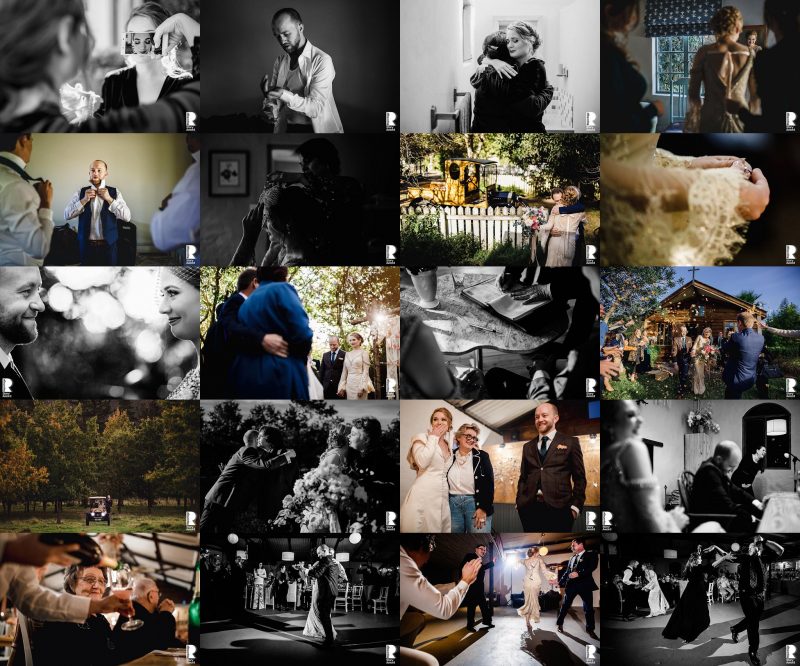
Ruan:
I didn’t even do the speech at our own wedding. It’s – that’s how much I dislike public talking. If I’ve got a camera in my hand, it’s much different, then you don’t think about it. But if the cameras not there, then it’s like, no, thank you. I’m gonna try and I avoid it.
Alan:
I totally get that but you’re totally – you’re really naturally speaking to me, we’ve never spoken before and it feels totally natural, like we’ve known each other for loads longer.
Ruan:
But that’s good to hear.
Alan:
Have you ever thought – you must have thought about, you know, doing your own workshop or your own mentoring and things? Have you ever thought about that?
Ruan:
Not really, it’s not something that I’ve – I thought about maybe SEO at some stage, but it’s not really something that I’m –
Alan:
Not the photography though? Really?
Ruan:
Not a – I wouldn’t say not at all, because I always said, I’ll never be a wedding photographer when I was a student and I became a wedding photographer. Not really something that I’ve thought about or focused or said I will do that to try and do it and –
Alan:
Wow, you really should, I mean, obviously only if you want to, but I just know that you’re so good and just from talking to you here, you have so much to share. You should – I’m sure loads of people would love to learn from you. You should do it, man you should.
Ruan:
In light of what’s happening, it is something that should be considered. But it’s it falls in that category of public speaking, I think maybe just change the approach of how it’s done and I can maybe make it possible.
Alan:
Well, that’s true, because you could do it any way that you want to, you know, you don’t have to do it in certain ways. But yeah, you should do it, man, you should do it. We’ll do a holiday swap as well and you could shoot in the UK and you could do a workshop in the UK.
Ruan:
Holiday workshop.
Alan:
Yeah. Is there something that you hate, but that most people seem to love? It’s a strange question, isn’t it?
Ruan:
If it’s related to wedding photography, it might be the workshop thing. Any form of public speaking is something that I’m not too keen on. It’s just not something that’s me. But I think that admin related tasks to what we do, admin can be, especially if it’s in season, you’re getting a lot of inquiries, and most of the inquiries require a personal reply that takes quite some time. That can be quite, sort of an issue to complete and get it done when there’s so much work to do, and you just want to shoot and edit those files, but you get stuck with all that wedding related tasks.
Alan:
That’s so true, isn’t it? We have to do so many different tasks we do, don’t we? It’s quite overwhelming at times, it can be and, and sometimes I think, we think before we start being a wedding photographer that all it is is maybe just taking some photos and then we’re hit with the reality of, you know, you have to do so many different things
Ruan:
And it becomes more the longer you go on. It’s almost as if you try and if – the workload just reintroduces more things to that process as opposed to where it was five years ago when you just started and you just shot the wedding, did the processing delivered the files and you were done.
Alan:
That’s true. I see. Yeah, I never thought about it like that. That is so true. Oh, man. Okay, we’re gonna do one more question. Do you eat the canapés?
Ruan:
Almost never!
Alan:
Oh, really wow.
Ruan:
I thought of that, sort of trying to shoot as much as possible sort of getting that moment rather not… shooting as much as possible but trying to hunt that moment. So I’ve got my own snack pack with me at every wedding and it’s a snack bar and whatever I munch on that in between the day and when canapés come, I try to shoot, try and find that magic moment someone with a crazy dress or a laughter whatever that moment is, and try and find that and usually take my break in the evening when it’s dinnertime.
Alan:
Oh, okay. Oh, man, that’s a great answer and you’re very hard working as well, you are. Oh, man, thank you so much for talking to me. I really enjoyed talking to you, it was ace. You’re so open, so honest, so much – There’s so many great bits of interesting info there and tips and advice and just great hearing about you and your story as well, man.
Ruan:
Thank you. Thank you, Alan, thank you for the time and the opportunity. It’s amazing. And thank you for creating this and where we can post stories and learn more about shooting documentary and sort of moment photography.
Alan:
Thank you, man. I really enjoy it and it’s an honor to speak to you. It really is, as I say, one of my personal favorite photographers. I love your work. Yeah, if anyone’s listening now, do head to the site. This is Reportage.com. There’ll be a full transcript of this interview with Ruan and I’ll include lots of examples of his work and his Reportage Awards and Story Awards and links to his website as well. And yeah, man, honestly we’ve got to do that home swap some time and wedding swap.
Ruan:
It sounds like a really – I’m right next to the mountain. Yeah, we have to do that.
Alan:
We will, we’re gonna. Oh man, I’d love to meet you one day, I really would if you want to.
Ruan:
Likewise.
Alan:
Thanks so much, man.
Ruan:
Thank you, Alan, thank you. Keep well.
***********************************************************
We hope you enjoyed our Ruan Redelinghuys interview!
Visit his website or his This is Reportage profile.
Interested in joining us? Find out all the benefits and apply over here.
As mentioned on the podcast, we’ve just launched our sister-site for family photography, too – This is Reportage: Family.
